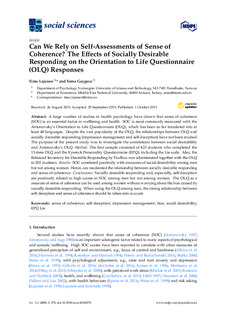| dc.contributor.author | Lajunen, Timo Juhani | |
| dc.contributor.author | Gaygisiz, Esma | |
| dc.date.accessioned | 2020-01-17T08:08:30Z | |
| dc.date.available | 2020-01-17T08:08:30Z | |
| dc.date.created | 2020-01-15T21:20:54Z | |
| dc.date.issued | 2019 | |
| dc.identifier.issn | 2076-0760 | |
| dc.identifier.uri | http://hdl.handle.net/11250/2636747 | |
| dc.description.abstract | A large number of studies in health psychology have shown that sense of coherence (SOC) is an essential factor in wellbeing and health. SOC is most commonly measured with the Antonovsky’s Orientation to Life Questionnaire (OLQ), which has been so far translated into at least 48 languages. Despite the vast popularity of the OLQ, the relationships between OLQ and socially desirable responding (impression management and self-deception) have not been studied. The purpose of the present study was to investigate the correlations between social desirability and Antonovsky’s OLQ. Method: The first sample consisted of 423 students who completed the 13-item OLQ and the Eysenck Personality Questionnaire (EPQ), including the Lie scale. Also, the Balanced Inventory for Desirable Responding by Paulhus was administered together with the OLQ to 202 students. Results: SOC correlated positively with measures of social desirability among men but not among women. Hence, sex moderated the relationship between socially desirable responding and sense of coherence. Conclusions: Socially desirable responding and, especially, self-deception are positively related to high scores in SOC among men but not among women. The OLQ as a measure of sense of coherence can be used among women without worrying about the bias caused by socially desirable responding. When using the OLQ among men, the strong relationship between self-deception and sense of coherence should be taken into account. | nb_NO |
| dc.language.iso | eng | nb_NO |
| dc.publisher | MDPI | nb_NO |
| dc.rights | Navngivelse 4.0 Internasjonal | * |
| dc.rights.uri | http://creativecommons.org/licenses/by/4.0/deed.no | * |
| dc.title | Can we rely on self-assessments of sense of coherence? The effects of socially desirable responding on the Orientation to Life Questionnaire (OLQ) responses | nb_NO |
| dc.type | Journal article | nb_NO |
| dc.type | Peer reviewed | nb_NO |
| dc.description.version | publishedVersion | nb_NO |
| dc.source.volume | 8 | nb_NO |
| dc.source.journal | Social Sciences | nb_NO |
| dc.source.issue | 10 | nb_NO |
| dc.identifier.doi | 10.3390/socsci8100278 | |
| dc.identifier.cristin | 1774263 | |
| dc.description.localcode | © 2019 by the authors. Licensee MDPI, Basel, Switzerland. This article is an open access article distributed under the terms and conditions of the Creative Commons Attribution (CC BY) license (http://creativecommons.org/licenses/by/4.0/). | nb_NO |
| cristin.unitcode | 194,67,40,0 | |
| cristin.unitname | Institutt for psykologi | |
| cristin.ispublished | true | |
| cristin.fulltext | original | |
| cristin.qualitycode | 1 | |

